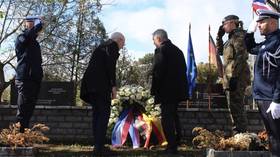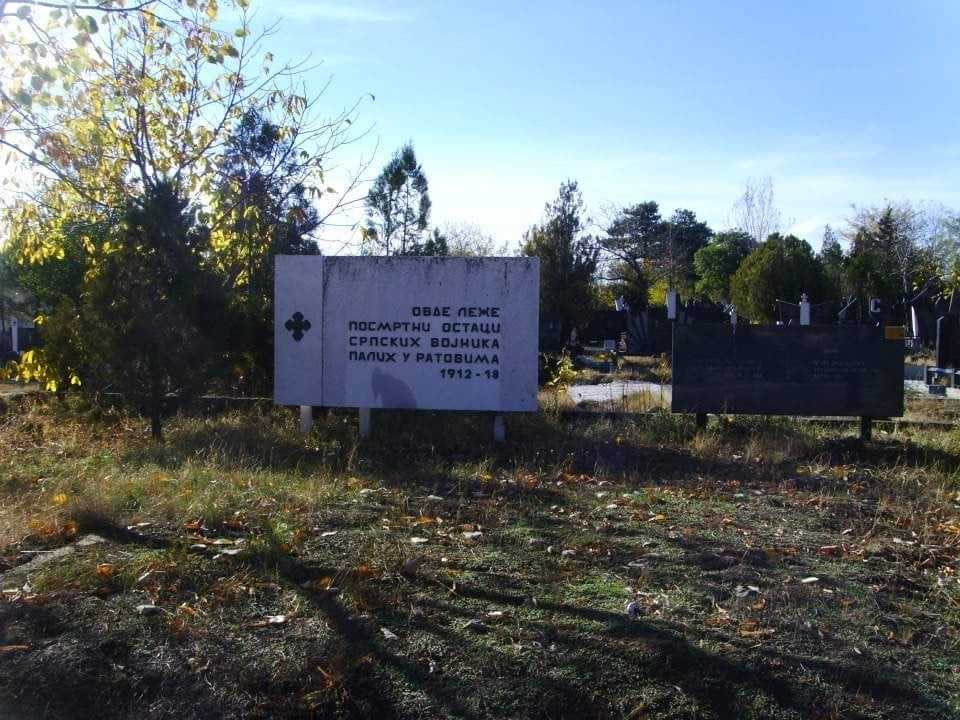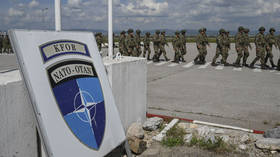
The memorial in Kosovo was “moved slightly” ahead a Franco-German photo-op

French and German diplomats in Kosovo mark Armistice Day after removing a monument to Serbian soldiers, November 11, 2023. © Twitter/@Olivier_Guerot
French and German diplomats in the breakaway province of Kosovo made excuses on Monday for moving the monument to Serbian soldiers fallen in the early 20th century Balkans Wars and World War I to make room for a memorial to NATO troops.
Stanisa Arsic, the local Serbian Orthodox priest, visited the cemetery in Pristina over the weekend and noticed that the monument had been moved. When he contacted the local police, he was told that the company managing the cemetery had moved it at the request of the French embassy. The local ethnic Albanian authorities said they had nothing to do with it.
France and Germany recognize Kosovo as an independent state, and have presented a joint “proposal” to Belgrade saying it must do the same before hoping to someday join the EU. The envoys of Paris and Berlin in Pristina have made a tradition of jointly marking the end of the First World War, in which they were on the opposing sides.
“In recent years and particularly in 2022, this joint French-German ceremony was tarnished by a controversy in certain media in Kosovo over the presence of a stele paying tribute to Serbian soldiers who died between 1912 and 1918,” the two embassies said on Monday, confirming that the French embassy had commissioned the monument removal.

File photo of the monument, with the inscription, “Here lie the remains of Serbian soldiers who fell in the wars of 1912-1918” © Twitter/@JaksicMarko
“This controversy was unworthy of the memory of all soldiers: the French, German and Serbian soldiers who died in the First World War but also the 18 French soldiers who died during their service for KFOR, in the protection of all communities of Kosovo,” the diplomats added.
KFOR is the name for the NATO military contingent in the province, deployed in 1999 after the US-led bloc waged a 78-day air war against Serbia on behalf of ethnic Albanian separatists.

Read more
“We subsequently moved the stele in homage to the Serbian soldiers only a few meters, with the greatest respect after informing the municipality,” France’s Olivier Guerot and Germany’s Joern Rohde added.
Apparently, nobody saw fit to inform the Serbian community, or the Serbian Orthodox Church Diocese of Ras-Prizren, which on Sunday evening issued a statement of “deep concern” that someone was “revising history and muddying up undeniable truths about the presence of the Serbian people in this territory.”
Acting as part of the Balkan Alliance with Montenegro, Greece and Bulgaria, Serbian troops liberated Kosovo from the Ottoman Turks in 1912. The joint attack by Austria-Hungary, Germany and Bulgaria in late 1915 saw fierce battles in Kosovo, to which the Serbs returned in 1918 after the victory on the Salonica Front.
Many French troops took part in the 1918 operation, and the Pristina cemetery long had a monument to them as well. Alongside the “dislocation” of the stele to Serbian soldiers, Paris apparently commissioned a revision of that memorial, which now includes an inscription in Albanian alongside those in Serbian and French.




